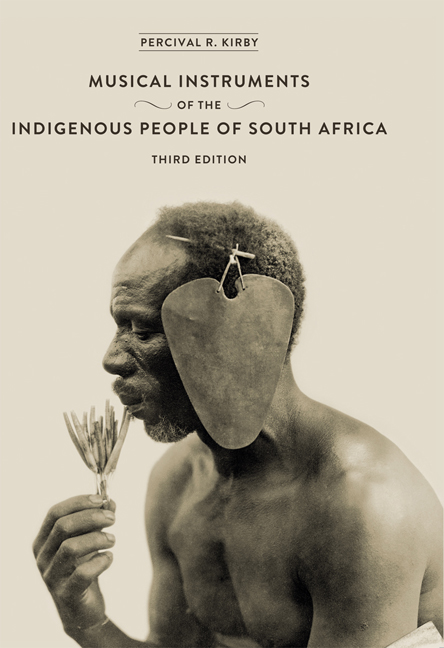Book contents
- Frontmatter
- Dedication
- Map
- Contents
- Foreword
- Preface to First Edition
- Preface to Second Edition
- Acknowledgements
- Acknowledgements to Third Edition
- List of Illustrations
- 1 Rattles and Clappers
- 2 Drums
- 3 Xylophones and ‘Sansas’
- 4 Bull-Roarers and Spinning-Disks
- 5 Horns and Trumpets
- 6 Whistles, Flutes, and Vibrating Reeds
- 7 Reed-Flute Ensembles
- 8 The ‘Gora’, A Stringed-Wind Instrument
- 9 Stringed Instruments
- 10 Bushman and Hottentot Violins and The ‘Ramkie’
- 11 Some European Instruments Played By Natives
- Appendix
- Addenda
- Index
Preface to First Edition
Published online by Cambridge University Press: 21 April 2018
- Frontmatter
- Dedication
- Map
- Contents
- Foreword
- Preface to First Edition
- Preface to Second Edition
- Acknowledgements
- Acknowledgements to Third Edition
- List of Illustrations
- 1 Rattles and Clappers
- 2 Drums
- 3 Xylophones and ‘Sansas’
- 4 Bull-Roarers and Spinning-Disks
- 5 Horns and Trumpets
- 6 Whistles, Flutes, and Vibrating Reeds
- 7 Reed-Flute Ensembles
- 8 The ‘Gora’, A Stringed-Wind Instrument
- 9 Stringed Instruments
- 10 Bushman and Hottentot Violins and The ‘Ramkie’
- 11 Some European Instruments Played By Natives
- Appendix
- Addenda
- Index
Summary
THIS study of the Musical Instruments of the Native Races of South Africa has been made possible by a generous grant received from the Carnegie Corporation of New York, through the Research Grant Board of the Union of South Africa. Without such assistance it would have been impossible for me to cover so large a field, for in the course of my investigations I have had to travel many thousands of miles. I undertook no fewer than nine special expeditions to distant native areas, as well as many shorter excursions. On these expeditions I frequently lived in native kraals, and participated in the musical performances of the people, the only way, in my opinion, for a European observer to learn and understand the principles underlying native music.
In this book my chief aim has been to attempt to supply specific and detailed information, and to correlate to some extent the earlier and often rather vague generalizations on the subject which have appeared in the works of travellers. South Africa, by which I mean that portion of the Continent which lies south of latitude 22°, or, roughly, south of the River Limpopo, has been, from the point of view of the ethnologist, in a very fortunate position. For hundreds of years little was known of it except those portions near the coast, which from the fifteenth century were regularly visited and described by travellers from many lands. The interior, on the other hand, remained practically unknown until the nineteenth century, when the driving force of European colonization opened it up rapidly, revealing a strangely chaotic mixture of races whose past history is only now being brought to light. Further, those non-African peoples who from time to time have visited the east coast of Africa, and even penetrated far inland, have had singularly little influence upon the peoples dwelling south of the Limpopo, and such influence may, I think, be readily recognized. In other words, the native races which have inhabited large areas of South Africa for the last five centuries or so have retained much of their original culture, although they have naturally exchanged many ideas and adopted not a few. There remains, it would seem, in spite of inter-tribal wars and their inevitable consequences, much that is ancient and individual among the various native peoples of South Africa.
- Type
- Chapter
- Information
- The Musical Instruments of the Indigenous People of South Africa , pp. xv - xviiiPublisher: Wits University PressPrint publication year: 2013



